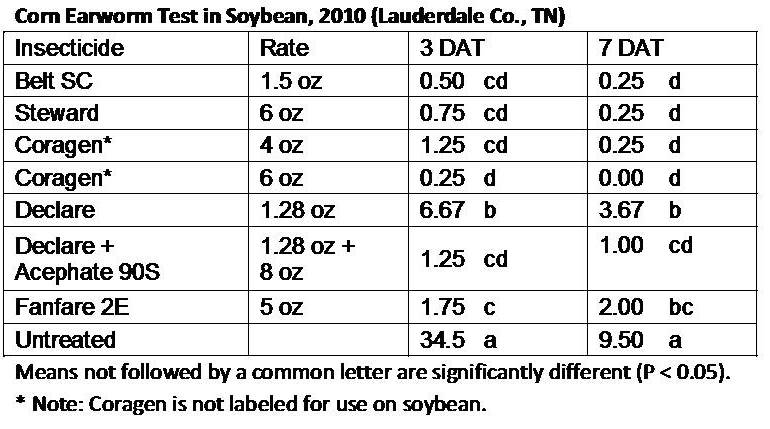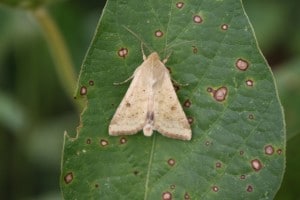Reports of high moth numbers in some areas indicate a strong likelihood that we will need to treat some soybean fields for corn earworm (a.k.a. bollworm). The high risk areas appear to be similar to last year and include Shelby, Tipton, Lauderdale, Dyer and Fayette Counties. However, this is a problem that could potentially occur anywhere. UT recommends treatment between R1 and R6 anytime counts reach or exceed an average of 9 larvae per 25 sweeps. In reality, serious infestations normally begin between R1 – R3 when plants are flowering heavily. It is also very common for infestations to be worst in fields that have a relatively open canopy, and thus, in late planted or wide-row fields.
The longtime standard treatment is a mid to high rate of a synthetic pyrethroid, and there are many labeled for use in soybean including Asana XL, Brigade, Fanfare, Discipline, Baythroid, Declare, Karate and Mustang Max. These are economical and effective choices. The only drawback is that they may flare populations of soybean looper because they knock out beneficial insects. I’ve had several people ask about less disruptive alternatives. Tracer (1.5 – 2 oz/a), Steward (6-9 oz/a) and Belt (2 oz/a) would be expected to provide comparable control of corn earworm and have less impact on beneficial insects. None of these products will control stink bugs or other non-caterpillar pests. They also tend to be more expensive. I’ve included some test data from a trial last year in a table below, and as can be seen, all treatments provided acceptable control. Declare, a synthetic pyrethroid, unless tank mixed with acephate was not quite as good as the other treatments. This may be partially explained by a low level of tobacco budworms that were also present.

The question becomes what are the chances of creating a looper problem when I spray a pyrethroid for corn earworm? Last year the risk was high as soybean loopers were looming on our doorstep much earlier in the season than usual. There are currently few reports of soybean looper infestations anywhere other than the coastal areas of the Midsouth. Soybean loopers tend to be a late season and sporadic pest in Tennessee. I am less concerned about this pest this year based on the lack of infestations to our south.


